Book contents
- Frontmatter
- Contents
- List of Contributors
- Acknowledgements
- Introduction
- Part I Science and Contemporary Poetry: Cross-Cultural Soundings
- Part II Science in Modernist Poetry: Appropriations and Interrogations
- Part III Darwinian Dialogues: Four Modern Poets
- 9 ‘Accidental Variations’: Darwinian Traces in Yeats's Poetry
- 10 Making the Past Wake: Anthropological Survivals in Hardy's Poetry
- 11 Reading Bishop Reading Darwin
- 12 From Bergson to Darwin: Evolutionary Biology in the Poetry of Judith Wright
- Afterword
- Bibliography
- Index
10 - Making the Past Wake: Anthropological Survivals in Hardy's Poetry
from Part III - Darwinian Dialogues: Four Modern Poets
- Frontmatter
- Contents
- List of Contributors
- Acknowledgements
- Introduction
- Part I Science and Contemporary Poetry: Cross-Cultural Soundings
- Part II Science in Modernist Poetry: Appropriations and Interrogations
- Part III Darwinian Dialogues: Four Modern Poets
- 9 ‘Accidental Variations’: Darwinian Traces in Yeats's Poetry
- 10 Making the Past Wake: Anthropological Survivals in Hardy's Poetry
- 11 Reading Bishop Reading Darwin
- 12 From Bergson to Darwin: Evolutionary Biology in the Poetry of Judith Wright
- Afterword
- Bibliography
- Index
Summary
Next this strange message Darwin brings,
(Though saying his say In a quiet way);
We all are one with creeping things
And apes and men
Blood-brethren,
And likewise reptile forms with stings.
(‘Drinking Song’, ll. 46–52)
In Thomas Hardy's ‘Drinking Song’ the speaker decodes Charles Darwin's ‘strange message’ with a uniquely complex blend of philosophical gravitas and darkly mischievous wit. What triggers this speaker's sardonic dismay is the possibility of a lineage reified in ‘blood’: a mysterious bond between ‘apes and men’ that survives ‘dull defacing Time’ (‘In the Night She Came’, l. 11). The phantasmagoric, visionary and uncanny components of Hardy's poetry, anchored in a radical repackaging of Darwin's scientific bequest, owes a signal though not widely canvassed debt to a late-Victorian anthropologist with a keen interest in questions of biological inheritance and ancestral memory, as well as in the ‘potential diffusion’ of consciousness and the ‘permeability’ of individual selfhood (Vrettos, 2007):
Among evidence aiding us to trace the course which the civilization of the world has actually followed, is that great class of facts to denote which I have found it convenient to introduce the term ‘survivals’. These are processes, customs, opinions, and so forth, which have been carried on by force of habit into a new state of society different from that in which they had their original home, and they thus remain as proofs and examples of an older condition of culture out of which a newer has evolved. (Tylor, 1903, I, 14–15)
So E. B. Tylor (1832–1917) expounds the doctrine of ‘survivals’ in his two-volume work of comparative ethnography Primitive Culture (1871), published a year before Hardy's pastoral romance Under the Greenwood Tree. Tylor's anthropological coinage encompasses those venerable instances of thought or practice that had obdurately withstood what Hardy calls ‘Time's transforming chisel’ (‘The Revisitation’, l. 109), lingering into later religious observances, political institutions and kinship organisations, thus signifying cumulative growth and continuity between archaic and more advanced forms of civilisation.
- Type
- Chapter
- Information
- Science in Modern PoetryNew Directions, pp. 167 - 180Publisher: Liverpool University PressPrint publication year: 2012

